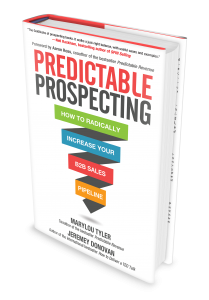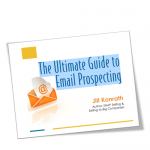Predictable Prospecting: How to Radically Increase Your B2B Sales Pipeline
 This book is a “must read” for all business development, marketing, sales and other revenue generation professionals in the information technology industry. Well, maybe for all of those in all industries.
This book is a “must read” for all business development, marketing, sales and other revenue generation professionals in the information technology industry. Well, maybe for all of those in all industries.
The book is a member of a family of books that came out last year and earlier this year and that describes the best practices for various revenue generation activities in a time where there is a desperate need for improving the productivity of each dollar we invest in sales and marketing. All the books have a practicable approach to what we used to call direct marketing, but that over the years have been renamed to outbound lead generation and sales through the telephone (although the approach also applies to situations where the final mile of the sales process requires meeting face to face with the potential customers).
These books are:
-
The Sales Acceleration Formula: Using Data, Technology, and Inbound Selling to go from $0 to $100 Million, by Mark Roberge.
-
Predictable Revenue (Turn Your Business Into A Sales Machine With $100 Million Best Practices of salesforce.com) by Aaron Ross and Marylou Tyler.
-
The Sales Development Playbook: Build Repeatable Pipeline and Accelerate Growth with Inside Sales by Trish Bertuzzi.
-
From Impossible To Inevitable: How Hyper-Growth Companies Create Predictable Revenue, by Aaron Ross and Jason Lemkin
The race for market leadership
 Apart from The Sales Acceleration Formula by Mark Roberge, that is based on the inbound “religion” preached by his company Hubspot (and not without some merit), the other books deal with business models that require knocking on the door of potential customers and building relationships that will lead to sales and revenue. Blind chickens can also find corn, so the two big questions all these books discuss are:
Apart from The Sales Acceleration Formula by Mark Roberge, that is based on the inbound “religion” preached by his company Hubspot (and not without some merit), the other books deal with business models that require knocking on the door of potential customers and building relationships that will lead to sales and revenue. Blind chickens can also find corn, so the two big questions all these books discuss are:
- How do we design our business development, marketing, sales development, sales, account management and other revenue generation activities so they provide predictable outcomes?
- How do we ensure that we can scale these activities, maintain predictability and achieve steadily falling customer acquisition cost per revenue dollar.
Although none of the books explicitly refers to why scalability is so crucial I dare conclude that they all agree that the objective of any information technology business must be reaching the market leadership position before the competitors. Crossing the chasm, passing the tipping point and achieving market leadership changes the market dynamics in your favour, you will enjoy higher profitability than your competitors and you will be hard to beat for any insurgent.
Filling the pipeline
 Most technology companies actually do a decent sales job when they first have got their foot in the door and sit at the table with a potential customer. The challenge for most is that they sit there far too seldom and therefore Predictable Prospecting by Marylou Tyler and Jeremy Donovan comes as a godsend. The book effectively punctures the myth that lead generation is some sort of magic or wizardry and instead the book gives you a step by step approach for designing an approach that will work.
Most technology companies actually do a decent sales job when they first have got their foot in the door and sit at the table with a potential customer. The challenge for most is that they sit there far too seldom and therefore Predictable Prospecting by Marylou Tyler and Jeremy Donovan comes as a godsend. The book effectively punctures the myth that lead generation is some sort of magic or wizardry and instead the book gives you a step by step approach for designing an approach that will work.
Well begun is half done
She who expects to find a quick formula for combining some specific words that will open all doors will be disappointed. Part one of the book is about crafting a competitive value proposition and carefully, very carefully identifying the target segment, the ideal prospect (account profile) and the various personas that we should expect to engage with. 30% of the book is devoted to planning and profiling, but it pays off to hold out and read these pages carefully. You may end up as a blind chicken if you don’t: You may find corn, but not very often.
If you, as many others (including myself), have a strong propensity for action then it is worthwhile remembering that “planning is cheap and execution is expensive”. While “just do it” may sound more macho than “think” it often pays off to at least think a little bit before you jump head first into an unknown swimming pool.
Crafting the message
 What I truly enjoyed when reading part two of the book was the logical approach and the practical examples. Marylou and Jeremy give you templates that you can use as the starting point for making your own outbound lead generation machine. I had a conversation with Marylou some weeks ago and we agreed that the examples given in the book will work well in North America and Northern Europe, while they will need some tweaking before they will work in other cultures.
What I truly enjoyed when reading part two of the book was the logical approach and the practical examples. Marylou and Jeremy give you templates that you can use as the starting point for making your own outbound lead generation machine. I had a conversation with Marylou some weeks ago and we agreed that the examples given in the book will work well in North America and Northern Europe, while they will need some tweaking before they will work in other cultures.
The approach recommended by Marylou and Jeremy is based on two premises:
- We must assume that the leads on our list don’t have an active need for what we offer. We therefore need to engage with providing something of value that is not just pushing our products and our company.
- We don’t know if the leads on our list are a good fit for our value proposition, so the first objectives when getting contact is to clarify this (AWAF: Are we a fit?).
The book provides guidelines, recommendations and templates for e-mail campaigns as well as the follow-up phone calls, recognising that phone calls are very expensive and that we therefore must have a very high probability that we are calling on the best possible prospects.
Building, managing and growing the organisation
The third and last part of the book is devoted to all the issues and challenges associated with monitoring performance and with building, managing and growing an organisation that can produce a steadily increasing stream of qualified leads for our business. When I started reading this part of the book I had the expectation that this may be filler material to bring the book beyond 200 pages (which often is the case with non-fiction books), but I was wrong. There is genuine value in these pages as well. What good does it do if you have the recipe for crafting powerful messages and can design effective call flows if you don’t know how to build and grow an organisation that can execute your wonderful blueprints?
 All pages in this book are worth reading twice. For most companies and individuals engaged with business development, marketing, sales development, sales, account management and other revenue generation activities this book could well be their bible when it comes to ensuring predictable lead generation.
All pages in this book are worth reading twice. For most companies and individuals engaged with business development, marketing, sales development, sales, account management and other revenue generation activities this book could well be their bible when it comes to ensuring predictable lead generation.
Five out of five stars.
Predictable Prospecting: How to Radically Increase Your B2B Sales Pipeline by Marylou Tyler and Jeremy Donovan, McGraw-Hill Education; 1 edition (August 15, 2016), 256 pages.








